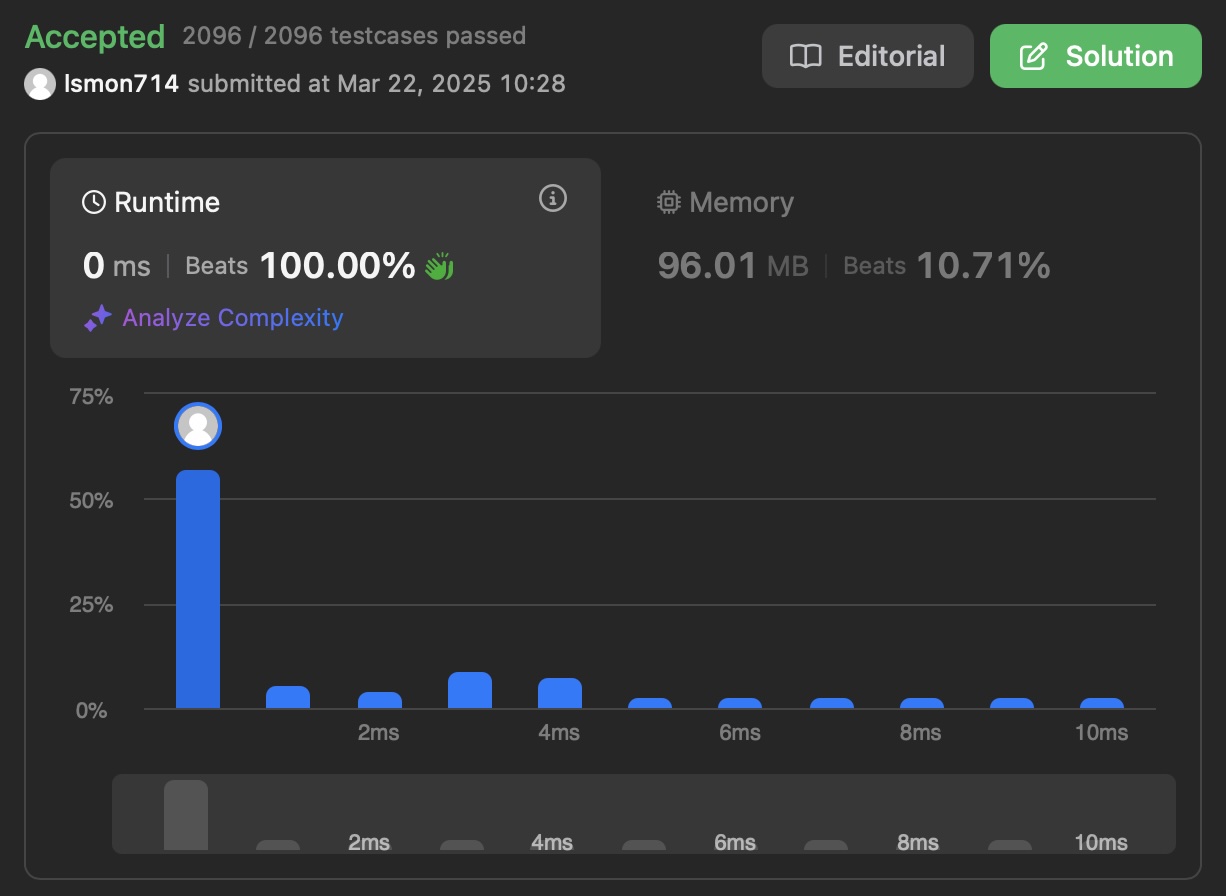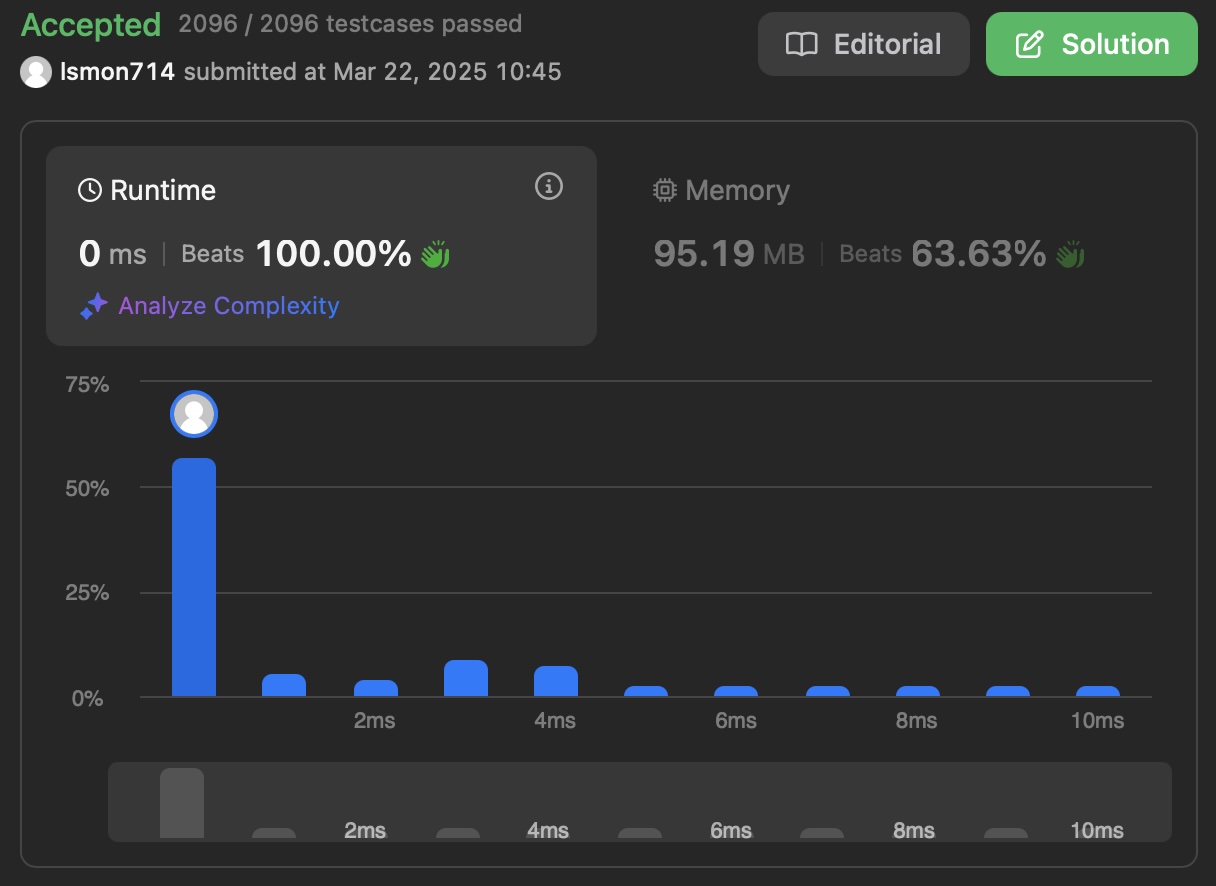4. Median of two sorted arrays



Problem
Given two sorted arrays nums1 and nums2 of size m and n respectively, return the median of the two sorted arrays.
The overall run time complexity should be $O(log (m+n))$.
Example 1:
Input: nums1 = [1,3], nums2 = [2]
Output: 2.00000
Explanation: merged array = [1,2,3] and median is 2.
Example 2:
Input: nums1 = [1,2], nums2 = [3,4]
Output: 2.50000
Explanation: merged array = [1,2,3,4] and median is (2 + 3) / 2 = 2.5.
Constraints:
nums1.length == m
nums2.length == n
0 <= m <= 1000
0 <= n <= 1000
1 <= m + n <= 2000
$-10^6$ <= nums1[i], nums2[i] <= $10^6$
Brute forced and easy solution

Intuition
Conceptually Merge the Arrays: Combine nums1 and nums2 into a single sorted sequence (or find the median without fully merging, which we’ll optimize later). Determine the Middle Position(s): Total elements = 9 (odd), so take the element at position 5 (index 4).
If it were even, you’d average the two middle elements.
Approach
Merge the two sorted arrays Add the remaining elements from nums1, if any Add the remaining elements from nums2, if any Find the median If there are odd number of elements I just need to return the middle element Otherwise I just need to find the average of the two middle elements Complexity
Time complexity
$O(n+m)$ where n is the first list and m is teh second
Space complexity
$O(n+m)$ where n is the first list and m is teh second
Code
class Solution {
public:
double findMedianSortedArrays(vector<int>& nums1, vector<int>& nums2) {
// Merge the two sorted arrays
vector<int> merged;
int i = 0, j = 0;
while (i < nums1.size() && j < nums2.size()) {
if (nums1[i] <= nums2[j]) {
merged.push_back(nums1[i++]);
} else {
merged.push_back(nums2[j++]);
}
}
// Add remaining elements from nums1, if any
while (i < nums1.size()) merged.push_back(nums1[i++]);
// Add remaining elements from nums2, if any
while (j < nums2.size()) merged.push_back(nums2[j++]);
// Find the median
int total = merged.size();
if (total % 2 == 1) {
// Odd number of elements: return middle element
return merged[total / 2];
} else {
// Even number of elements: average of two middle elements
return (merged[(total - 1) / 2] + merged[total / 2]) / 2.0;
}
}
};
Optimized and hard solution

Intuition
I believe that a binary search can achieve a better performance without merging the arrays.
Approach
- partitioning both arrays so always I have as the first array (
num1) as the shortest array. - binary search on the smaller array to find the correct partition point.
- median calculation:
- Odd legnth: take the maximum of the left partition elements
- Event length: average the max of the left and min of the right.
Complexity
- Time complexity:
$O(log(min(n,m))$
- Space complexity:
$O(log(min(n,m))$
Code
class Solution {
public:
double findMedianSortedArrays(vector<int>& nums1, vector<int>& nums2) {
int n1 = nums1.size(), n2 = nums2.size();
// Ensure nums1 is the smaller array for efficiency
if (n1 > n2) return findMedianSortedArrays(nums2, nums1);
int total = n1 + n2;
int half = (total + 1) / 2; // Left partition size
int left = 0, right = n1;
while (left <= right) {
int mid1 = left + (right - left) / 2; // Elements from nums1
int mid2 = half - mid1; // Elements from nums2
// Get the boundary elements
int l1 = (mid1 > 0) ? nums1[mid1 - 1] : INT_MIN; // Left of nums1
int r1 = (mid1 < n1) ? nums1[mid1] : INT_MAX; // Right of nums1
int l2 = (mid2 > 0) ? nums2[mid2 - 1] : INT_MIN; // Left of nums2
int r2 = (mid2 < n2) ? nums2[mid2] : INT_MAX; // Right of nums2
// Check if partitions are correct
if (l1 <= r2 && l2 <= r1) {
if (total % 2 == 1) {
return max(l1, l2); // Odd case: max of left partition
} else {
return (max(l1, l2) + min(r1, r2)) / 2.0; // Even case: average
}
} else if (l1 > r2) {
right = mid1 - 1; // Too many from nums1
} else {
left = mid1 + 1; // Too few from nums1
}
}
return 0; // Should never reach here with valid input
}
};